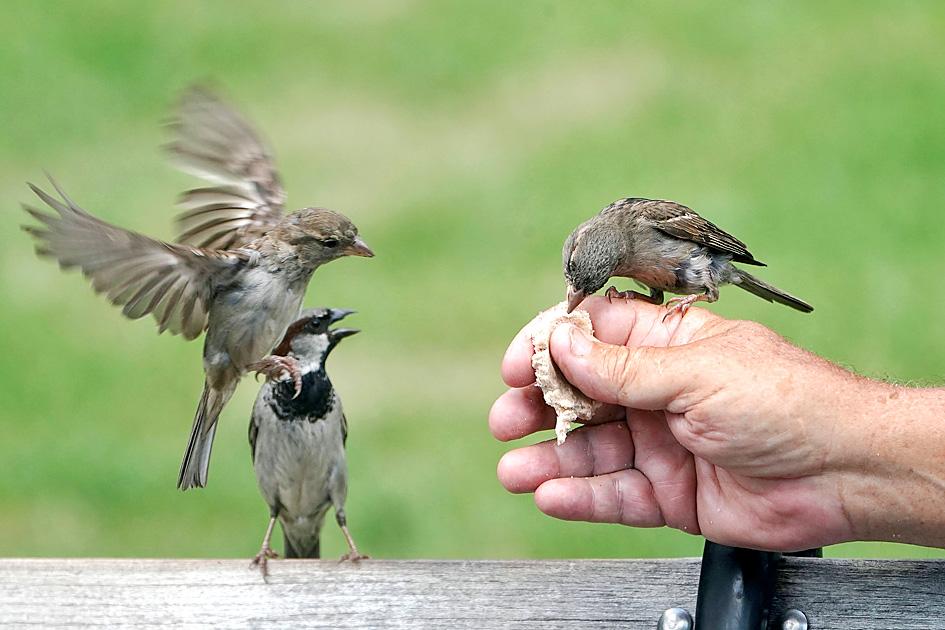As the streets of San Francisco emptied out in the first months of the COVID-19 pandemic, the city’s male birds began singing more softly and improving their vocal range, making them “sexier” to females, a study published on Thursday found.
The paper adds to a growing body of research describing how animals — from whales and coyotes to the white-crowned sparrow studied here — have adapted their behaviors to COVID-19 shutdowns that have forced humans to retreat to their homes, a phenomenon dubbed the “anthropause.”
“When the city was loud, they were singing really loudly,” said University of Tennessee behavioral ecologist Elizabeth Derryberry, who led the study published in Science.

Photo: Reuters
However, as city traffic ground to a halt following a statewide shelter-in-place order in the spring, noise levels fell by 50 percent, she said.
The number of vehicles on the Golden Gate Bridge collapsed to 1954 levels, the researchers found.
They compared birdsong data that they collected from previous years to recordings made at the same sites from April to May, and found that sparrows were now singing far more quietly and were capable of hitting much lower notes, which in turn expanded their range and enhanced their overall performance.
Imagine going to a party at a friend’s house: at the start of the night, you speak at a normal volume, but as the place fills up, you need to raise your voice to be heard.
“When you’re shouting at a cocktail party, your voice is not at its best,” Derryberry said, adding that it was similar for the studied birds.
As noise pollution decreased, “their songs also sounded better — they sounded sexier,” she said. “They were better competitors and they sounded like better mates to females.”
The authors said their study showed how quickly birds can adapt to changing environments, and suggests that finding solutions to curbing noise pollution might lead to other positive outcomes, such as higher species diversity.

Packed crowds in India celebrating their cricket team’s victory ended in a deadly stampede on Wednesday, with 11 mainly young fans crushed to death, the local state’s chief minister said. Joyous cricket fans had come out to celebrate and welcome home their heroes, Royal Challengers Bengaluru, after they beat Punjab Kings in a roller-coaster Indian Premier League (IPL) cricket final on Tuesday night. However, the euphoria of the vast crowds in the southern tech city of Bengaluru ended in disaster, with Indian Prime Minister Narendra calling it “absolutely heartrending.” Karnataka Chief Minister Siddaramaiah said most of the deceased are young, with 11 dead

By 2027, Denmark would relocate its foreign convicts to a prison in Kosovo under a 200-million-euro (US$228.6 million) agreement that has raised concerns among non-governmental organizations (NGOs) and residents, but which could serve as a model for the rest of the EU. The agreement, reached in 2022 and ratified by Kosovar lawmakers last year, provides for the reception of up to 300 foreign prisoners sentenced in Denmark. They must not have been convicted of terrorism or war crimes, or have a mental condition or terminal disease. Once their sentence is completed in Kosovan, they would be deported to their home country. In

Brazil, the world’s largest Roman Catholic country, saw its Catholic population decline further in 2022, while evangelical Christians and those with no religion continued to rise, census data released on Friday by the Brazilian Institute of Geography and Statistics (IBGE) showed. The census indicated that Brazil had 100.2 million Roman Catholics in 2022, accounting for 56.7 percent of the population, down from 65.1 percent or 105.4 million recorded in the 2010 census. Meanwhile, the share of evangelical Christians rose to 26.9 percent last year, up from 21.6 percent in 2010, adding 12 million followers to reach 47.4 million — the highest figure

LOST CONTACT: The mission carried payloads from Japan, the US and Taiwan’s National Central University, including a deep space radiation probe, ispace said Japanese company ispace said its uncrewed moon lander likely crashed onto the moon’s surface during its lunar touchdown attempt yesterday, marking another failure two years after its unsuccessful inaugural mission. Tokyo-based ispace had hoped to join US firms Intuitive Machines and Firefly Aerospace as companies that have accomplished commercial landings amid a global race for the moon, which includes state-run missions from China and India. A successful mission would have made ispace the first company outside the US to achieve a moon landing. Resilience, ispace’s second lunar lander, could not decelerate fast enough as it approached the moon, and the company has